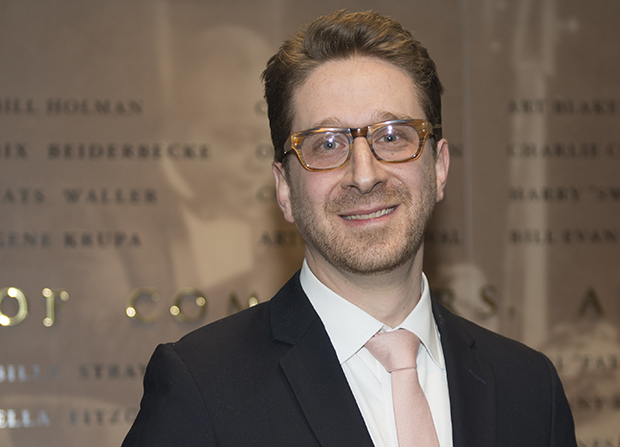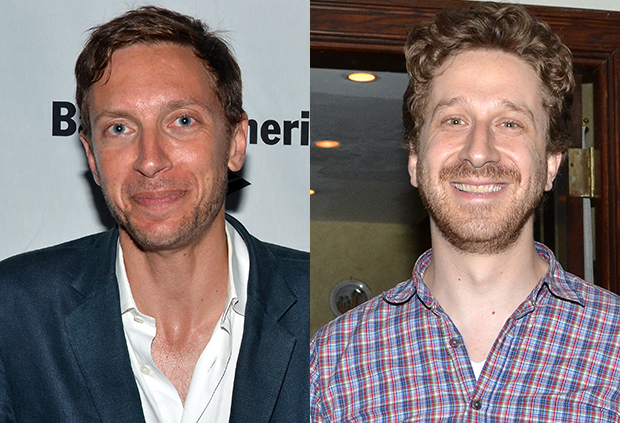Daniel Goldstein on Grappling With Grief and Memory in Unknown Soldier

(© Allison Stock)
Daniel Goldstein describes the new musical Unknown Soldier as a show about understanding the present by excavating the past, and that synopsis rings true both onstage and off.
The musical is set across three generations: Ellen (both as a child and adult) grapples with her grandmother's history and the mysterious identity of her grandfather. The story is loosely inspired by a soldier found in the Lyon train station in France during World War I, whom several families tried to claim him as their own, resulting in a long, drawn-out court case.
"Michael [Friedman] and I were really interested in telling a sort of past and present mystery," Goldstein said, noting inspirations like Possession and Arcadia. "And I was trying to figure out how to live in the present means searching for what the past is."
Of course, there's a major figure from Goldman's own past that he's also investigating through this show: his co-writer. The acclaimed composer and lyricist died in 2017 from complications related to HIV, and for the production at Playwrights Horizons, his presence has loomed large in the rehearsal room and onstage.
"There's so much of Michael's voice in it," said Goldstein, who wrote the book of the musical and co-wrote the lyrics with Friedman. "It felt great and also painful to have him so present in the room. It's cathartic and amazing and also psychologically taxing in a way that we weren't quite aware of until we were through the first week of previews. But it's also so great to unearth that voice from wherever he is."

(© David Gordon)
What was the biggest challenge for you in crafting a story that follows three generations?
Keeping the story simple as possible and also understanding where we plant clues for an audience so that they're drawn into the story, but have enough information to not make them confused. I think there are some literalists who will still be spending their time in this place, searching for exactitude rather than allowing the story to take them where it goes, but that's not who we're writing it for.
You did a production of the show at Williamstown Theatre Festival in 2015. How has the musical evolved since then?
In 2015, before the last performance, Michael made me and [director] Trip [Cullman] go have ice cream at Lickety Split at the end of Main Street in Williamstown and talk about all the things that we wanted to change. We felt we had gotten a good sense of the present-day stories, but the past was a bit of a cipher… There's a moment where Lucy is putting out the breakfast for her husband and then realizes that he's gone — that was the song that I took from one of the songs at Williamstown and rewrote the lyric for this production so that we focus our attention on Lucy. Our hope was that as we're seeing Ellen and Andrew's story unfold, you're really seeing Lucy's in a co-equal way .
You've done a lot of work as a director and book writer, but is this the first time you've written lyrics for a show?
I never really thought of myself as lyricist. However, the way that Michael and I wrote required that I wrote some of the lyrics. So whether that was me writing a version of the lyrics and Michael writing the better version of it, or me writing something and him setting it, we ended up writing a lot of the lyrics together.
For instance, "Andrew's Story," a long song in the later part of the show, I wrote a big speech and I thought Michael would find a song in it and he ended up just setting it [to music].
What reactions or stories have you heard from people who have seen the show?
There have been a bunch of friends and colleagues there, and they all say the same thing, like, "It was so wonderful to hear his voice." And I also think this score is so different than anything else anyone really knows of his. It's like you're seeing a different side of this person you just never knew existed.
How is the show personal for you?
I related to it differently before Michael died, and now, there's a lot that I think about that has to do with the loss of him and what he was thinking about as he wrote this. But for me, it is a story about both loss and empathy and how as humans get older, our ability to empathize gets larger.
And something I certainly strive for in my daily life is to find places where I can have more empathy for people. I think people are very quick to judgment, myself included. And I think we should strive for that sense of looking at another human being, especially someone as close to you as your grandmother, and understanding not just that she is awful, but that there might be a reason why.











